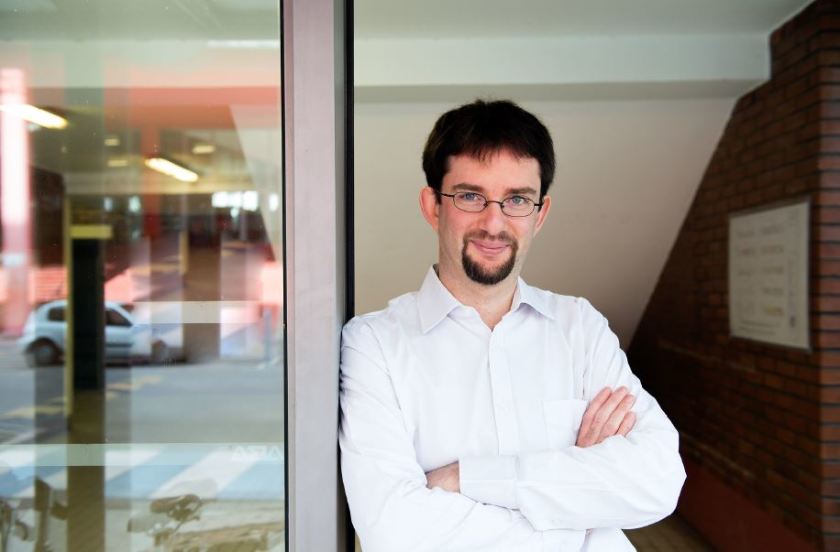Guest researcher at HZB: Bessel Prize Winner Benjamin Rotenberg

Benjamin Rotenberg is a guest researcher at the HZB-Institute for Solar Fuels in 2018. © CNRS/Cyril Fresillon
Prof. Benjamin Rotenberg has received a Friedrich Wilhelm Bessel Research Prize from the Alexander von Humboldt Foundation for 2018 and will be spending time regularly as a guest researcher at the Helmholtz-Zentrum Berlin. Rotenberg is a researcher of the Centre National de Recherche Scientifique (CNRS) and heads a research group in Sorbonne Université in Paris. He works in an interdisciplinary area spanning physics and chemistry for modelling transport processes in materials, at interfaces, and in electrolytes.
Rotenberg heads a theory group at the PHENIX laboratory of the (CNRS) and Sorbonne Université in Paris. He has previously worked at research establishments in Amsterdam, Berkeley, Barcelona, and Cambridge. The models developed by him can be applied to many problems, especially to those in the environmental field and energy research.
Currently, Rotenberg is concentrating on processes in complex material systems that are of interest for energy storage and conversion. It was for this reason that Prof. Joe Dzubiella, who heads a theory group at the HZB, nominated him for the Bessel Research Prize. During his time at the HZB-Institute for Solar Fuels, Rotenberg will work closely with colleagues from experimentation groups investigating complex electrolytes and catalysts that facilitate production of hydrogen from sunlight.
About the Friedrich Wilhelm Bessel Research Prize
Nominees for the Friedrich Wilhelm Bessel Research Prize must be internationally recognised scientists from abroad who have completed their doctorates no more than 18 years ago. This funding enables them to carry out research of their own choosing in collaboration with colleagues in Germany over a period of up to one year. The prize is endowed with 45,000 euros.
For further information: https://www.humboldt-foundation.de/web/bessel-award.html
arö
-
A new way to control the magnetic properties of rare earth elements
The special properties of rare earth magnetic materials are due to the electrons in the 4f shell. Until now, the magnetic properties of 4f electrons were considered almost impossible to control. Now, a team from HZB, Freie Universität Berlin and other institutions has shown for the first time that laser pulses can influence 4f electrons- and thus change their magnetic properties. The discovery, which was made through experiments at EuXFEL and FLASH, opens up a new way to data storage with rare earth elements.
-
BESSY II shows how solid-state batteries degrade
Solid-state batteries have several advantages: they can store more energy and are safer than batteries with liquid electrolytes. However, they do not last as long and their capacity decreases with each charge cycle. But it doesn't have to stay that way: Researchers are already on the trail of the causes. In the journal ACS Energy Letters, a team from HZB and Justus-Liebig-Universität, Giessen, presents a new method for precisely monitoring electrochemical reactions during the operation of a solid-state battery using photoelectron spectroscopy at BESSY II. The results help to improve battery materials and design.
-
From waste to value: The right electrolytes can enhance glycerol oxidation
When biomass is converted into biodiesel, huge amounts of glycerol are produced as a by-product. So far, however, this by-product has been little utilised, even though it could be processed into more valuable chemicals through oxidation in photoelectrochemical reactors. The reason for this: low efficiency and selectivity. A team led by Dr Marco Favaro from the Institute for Solar Fuels at HZB has now investigated the influence of electrolytes on the efficiency of the glycerol oxidation reaction. The results can help to develop more efficient and environmentally friendly production processes.
